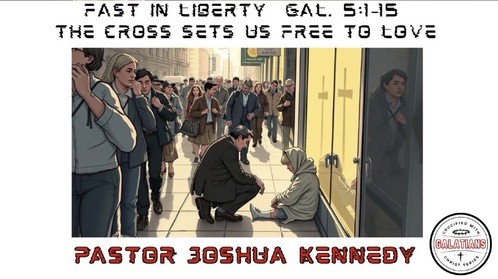KE Group Questions
Week of March 1, 2026
Summary
Pastor Joshua Kennedy teaches from Galatians 5:1-15 about standing fast in the liberty that Christ has given us. He emphasizes that Christ has truly set us free from both the bondage of sin and the bondage of religion. The key message is that faith must express itself in love - this is what truly matters to God. When we try to add anything to grace or fall into religious performance, we fall away from grace. The cross sets us free to love others by denying ourselves daily. Following the sermon, Donna Mala teaches about Purim and the importance of the church standing with Israel, explaining the biblical foundation for Jewish-Gentile unity in Christ and calling the church to pray and fast for God's chosen people.
Ice Breaker
What is one simple act of love or kindness that someone showed you recently that made your day better?
Key Verses
- Galatians 5:1
- Galatians 5:6
- Galatians 5:13-14
- 1 Corinthians 13:1-3
- 1 Corinthians 13:4-8
Questions
- Pastor Joshua said that we can fall from grace not just by falling into sin, but also by falling into religion. What's the difference between walking in relationship with God versus walking in religion?
- According to Galatians 5:6, what is the only thing that truly matters? How does this challenge our priorities as believers?
- The sermon mentioned that 'the cross sets us free to love.' How does denying ourselves daily enable us to love others better?
- Looking at the 1 Corinthians 13 'love test' that was discussed, which aspect of love do you find most challenging to live out consistently?
- Pastor Joshua used the illustration of his son running - how performance pressure affected his freedom and joy. Can you relate to this in your spiritual life? When have you felt weighed down by expectations rather than running freely in God's love?
- The message emphasized that we either live in the flesh or live in the Spirit daily. What are some practical ways we can 'wait on the Lord' and live in the Spirit each day?
- How can we guard against judging others based on external appearances rather than looking at their hearts? What does it look like to point people to God instead of pointing out their faults?
- Donna Mala spoke about the church's calling to stand with Israel and pray for God's chosen people. How does understanding our Jewish roots affect our identity as believers?
Life Application
This week, take the 1 Corinthians 13 'love test' daily. Each morning, read through the characteristics of love (patient, kind, not jealous, not boastful, etc.) and ask God to help you express one specific aspect of His love to someone that day. At the end of each day, reflect on how you did and where you need God's grace to love better. Also, consider participating in the three-day Esther fast (March 2-4) as the church seeks God together for greater freedom and love.
Key Takeaways
- Christ has truly set us free from both sin and religious bondage - we must believe this and stay free
- Faith expressing itself in love is the only thing that truly matters to God
- We can fall from grace by adding works or performance to simple faith in Christ
- The cross sets us free to love by enabling us to deny ourselves daily
- Love is the test of whether we're walking with God, who is love - it's seen in how we treat each other
Growing spiritually takes a daily personal walk with God and a gathering together in fellowship with other believers.
Our corporate gathering is for equipping the saints, but meeting in small groups allows regular individual
participation so that personal needs can be addressed.
Small groups also foster growth in ministering the gifts of the Holy Spirit, accountability, and the support
necessary to be a healthy member of the family of God.
The leadership of Praise Tabernacle has encouraged group leaders to be missional and evangelistic
in their approach to leading these groups.
The ultimate goal is Kingdom Expansion.
KE (KINGDOM EXPANSION)
GROUP LOCATIONS
Egg Harbor Township
Wednesday Nights @ 6:30 pm - Andy & Lori Holman's home -
1st & 3rd Wednesday Nights @ 7:00 pm - Terry & Sue Luma's home -
Mays Landing
1st Wednesdays, 7 pm - Host: Pastor Josh & Loraine Kennedy;
3rd Wednesdays, 7 pm - Host: Matt & Elise Lucas;
4th Wednesday, 7 pm - Host: Caleb & Tahlia Wilkes;
Reach out to Pastor Josh if you have any questions: (609) 402-8869
Egg Harbor City
2nd & 4th Wednesday Nights @ 6:30pm - Eddie Aponte's home -
Galloway
2nd & 4th Wednesday Nights @ 6:30pm -Greg & Regina's home
Ocean View
Sunday Nights (Every 1st & 3rd) @ 6pm - Joanne Utt's Home -


